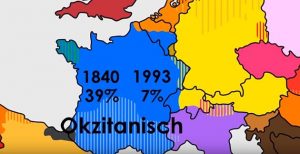
Last time, we already talked about the fact that the use of language alone is incapable of creating or eliminating an organically rooted identity.
This time we would like to touch upon another misconception that the supporters of such a view have. Namely, their notion of language as something spiritual, while blood relationship is considered to be materialistic.
In fact, for any person who really knows the history of modern national languages, cultures and states, such ideas can not cause anything other than laughter. To think so was forgivable for German idealist philosophers in the XIX century, however, today we already know enough about the history of the creation and dissemination of modern European languages, not to have such illusions.
In short, the languages of modern European nations and states are the product of a social machine or, as the French philosopher Foucault said, a fabric, but not an idealism. These languages were established by the power of the centralized states of the New Age, displacing the diversity of local languages and dialects on their territories.
(switch on English titles in video)
The fact that today the inhabitants of European states speak only their languages and not so many dialects is a consequence of the fact that their ancestors in the XVIII, XIX or even XX centuries were forced to go to the same schools, where they learned to speak these languages, served in the armies, where they used them, needed to use them in their work and everyday life, etc. In many cases, local and native languages were displaced as a result of a special assimilation politics. Even today, “Right” politicians in some countries require immigrant children to go to kindergartens intensively, rather than to grow up in homes, or even to force these immigrants to speak at home in the official state language, rather than their own languages. All this is nothing but violence and unification of the Modern Age, not an idealism.
Of course, we are not going to struggle now with the results of the language unification and try to revive the ancient disappeared languages. For us as Muslims, only the Arabic language has a sacred meaning, as for the languages we use now, they are just products of our history and parts of our current reality. These are our languages, we love them, we think and speak using them, we are not going to refuse them. But to represent them as something spiritual, opposing them to blood relationship as materialistic, does not correspond neither to the reality, nor the Islamic vision.
Further, it is completely unclear why some languages can be considered ‘’responsibe’’ for the creation of European identity, while others are not. The overwhelming majority of Europeans speak Indo-European languages. But many Iranians, Afghans, Pakistanis and Indians, who are very far from Europe today, speak these languages as well. Hungarians and Finns speak non-Indo-European languages. They were brought to Europe by a small part of their ancestors, but for many centuries of living in it, they have genetically drowned in the overwhelming majority of Europeans, of which the modern Hungarians and Finns are an organic part. Similar is the history of other peoples speaking non-Indo-European languages, which after many centuries of living in Europe and mixing with Europeans are dominated by European genetics – the Rumelian Turks, Polish-Lithuanian and Volga Tatars. Which for indigenous European Muslims are of special importance.
If the non-European diaspora learns the European language, but for generations will live in genetic isolation and with its own special identity, it will not become European in the organic sense. On the contrary, the descendants of non-Europeans, who dissolved among Europeans, became one of them, even if they speak non-Indo-European languages.
Therefore, decisive for organic belonging to native Europeans is living among them for many generations, mixing with them and accepting their appearance. One language is not enough for it. Editorial




Comments